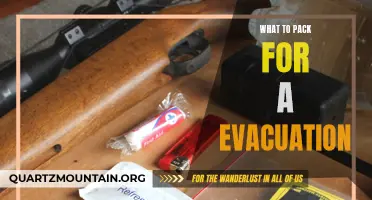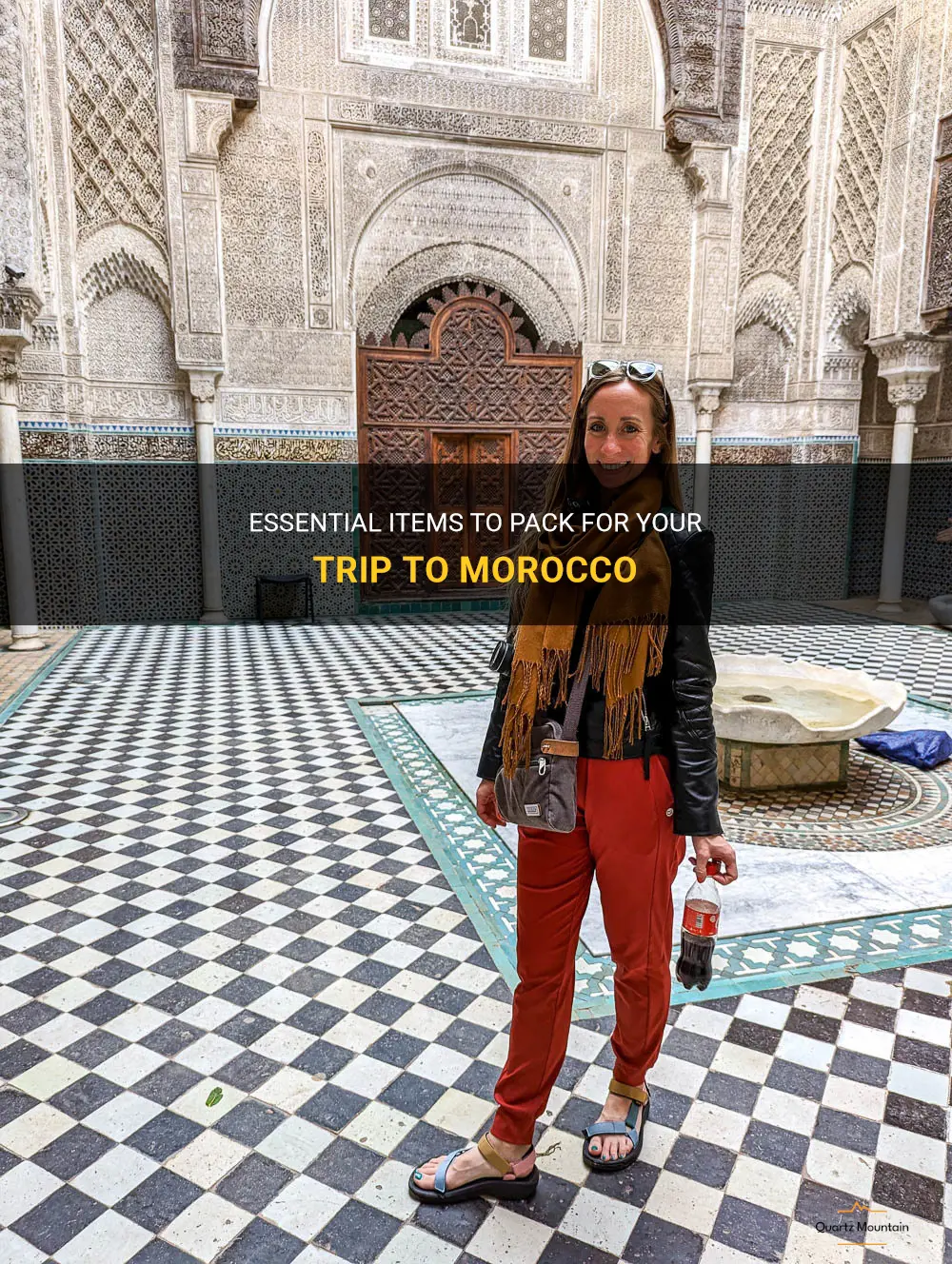
Planning a trip to the vibrant and enchanting country of Morocco? Before you jet off to explore the bustling medinas and breathtaking landscapes, make sure your suitcase is filled with the essential items you'll need to fully immerse yourself in this captivating North African destination. From sun protection in the hot desert climate to comfortable walking shoes for exploring narrow alleyways, this guide will ensure you're well-prepared for your adventure in Morocco.
| Characteristics | Values |
|---|---|
| Currency | Moroccan Dirham (MAD) |
| Weather | Varied, from Mediterranean to desert |
| Language | Arabic, Berber, French |
| Religion | Islam |
| Clothing | Lightweight, modest, and comfortable |
| Travel Adapter | Type C and Type E |
| Time Zone | Western European Time (WET) |
| Vaccinations | Recommended: Hepatitis A, Typhoid, Rabies |
| Voltage | 220-240V |
| Transportation | Taxis, buses, trains |
| Internet Access | Available in most urban areas |
| Emergency Numbers | Police: 19, Ambulance: 15, Fire: 15 |
| Drinking Water | Bottled water recommended |
| Travel Insurance | Recommended |
| Local Customs | Show respect for local traditions and customs |
| Food and Drinks | Try traditional dishes like tagine and mint tea |
| Safety Tips | Beware of pickpockets and scams |
| Important Documents | Passport, visa, travel insurance |
| Shopping | Bargaining is common in markets and souks |
| Mobile Connectivity | GSM network services available |
What You'll Learn
- What essentials should I pack for a trip to Morocco?
- What type of clothing should I bring for a trip to Morocco?
- Are there any specific items I should bring for exploring the Sahara Desert in Morocco?
- Should I pack any medications or first aid supplies for my trip to Morocco?
- Are there any cultural considerations when it comes to packing for a trip to Morocco?

What essentials should I pack for a trip to Morocco?
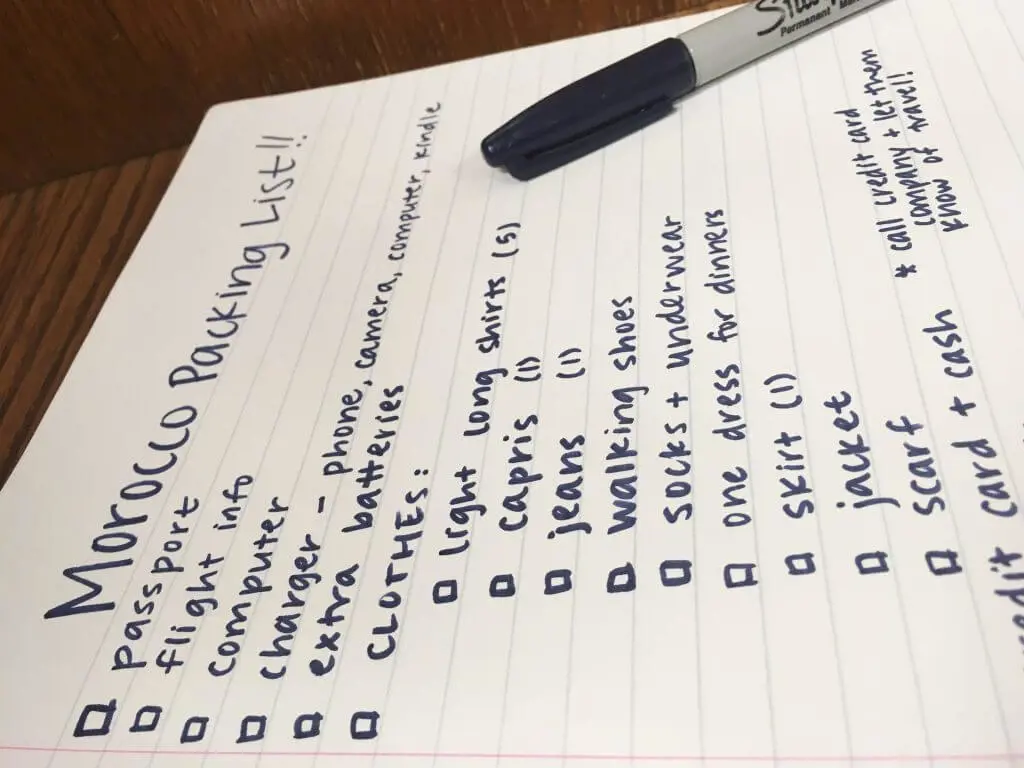
When it comes to packing for a trip to Morocco, there are a few essentials that you should definitely include in your suitcase. From appropriate clothing to essential items for the journey, here is a step-by-step guide on what to pack for your Moroccan adventure.
Clothing:
Morocco's climate can vary depending on the region and the time of year, so it's important to pack clothing suitable for different weather conditions. Regardless of the season, it's always a good idea to bring lightweight, breathable clothing that covers your shoulders and knees, especially if you plan on visiting religious sites. Packing a mix of long-sleeved shirts, pants, skirts, and dresses made from breathable fabrics such as linen or cotton is a wise choice. Additionally, don't forget to pack a light jacket or sweater for cooler evenings, and a hat and sunglasses to protect yourself from the sun.
Footwear:
Comfortable footwear is a must when traveling to Morocco, as you'll likely be doing a lot of walking and exploring. Opt for closed-toe shoes with good grip, such as sneakers or hiking shoes, as the streets in many cities can be uneven. If you're planning on doing any hiking or trekking in the Atlas Mountains, it's worth considering bringing a sturdy pair of hiking boots.
Essentials:
Besides clothing, there are a few essentials that you should always have with you when traveling to Morocco. These include:
- Travel documents: Make sure to bring your passport, visa (if necessary), and any other required travel documents. It's also a good idea to have copies of these documents in case of loss or theft.
- Money: Carry some cash in Moroccan dirhams, as well as a debit or credit card for larger purchases. ATMs are widely available in cities, but it's always a good idea to have some cash on hand.
- Adapter: Morocco uses a different type of power outlet, so remember to bring a universal adapter to charge your electronic devices.
- Medications: If you take any prescription medications, make sure to bring an ample supply for the duration of your trip. It's also a good idea to carry a basic first-aid kit with essentials such as pain relievers, band-aids, and any personal medications you may need.
- Toiletries: While you can easily find most toiletries in Morocco, it's always a good idea to pack travel-sized versions of your favorite products. Don't forget to also bring sunscreen, insect repellent, and hand sanitizer.
Cultural considerations:
Morocco is a predominantly Muslim country, so it's important to dress modestly and respect the local culture. In addition to covering your shoulders and knees, it's also a good idea to bring a scarf or shawl to cover your head when visiting mosques or religious sites. This will not only show respect but also allow you to fully experience the local customs and traditions.
To summarize, when packing for a trip to Morocco, remember to include appropriate clothing, comfortable footwear, essential documents and money, adapters for electronic devices, necessary medications, toiletries, and items for cultural consideration. By being prepared and packing smartly, you'll be able to fully enjoy your Moroccan adventure.
Essential Items for a Spring Getaway: What to Pack for France in April
You may want to see also

What type of clothing should I bring for a trip to Morocco?
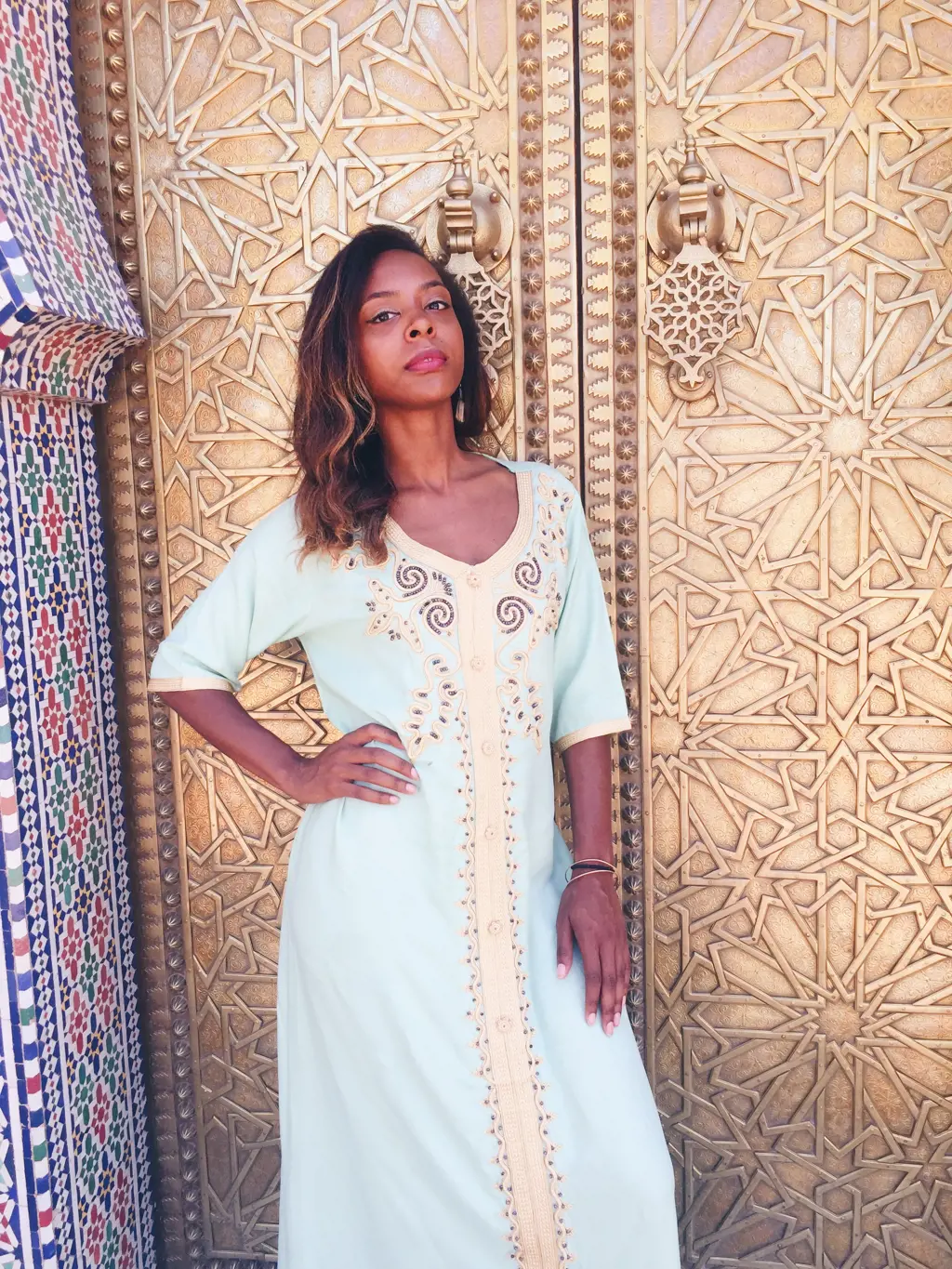
When preparing for a trip to Morocco, it is important to consider the cultural norms and climate of the region. Morocco has a diverse climate, ranging from hot summers to cold winters, and different regions may have different customs and traditions. To ensure a comfortable and respectful experience, it is advisable to pack a variety of clothing options.
Respectful Attire:
Morocco is a predominantly Muslim country, and it is important to dress modestly out of respect for the local culture and customs. Women are generally expected to cover their shoulders and knees, and avoid wearing revealing clothing. Men should also avoid wearing shorts, especially in more conservative areas. It is a good idea to pack lightweight, loose-fitting clothing that covers the arms and legs.
Layered Clothing:
Due to the varying climate in Morocco, it is wise to pack layered clothing. This will allow you to adapt to the changing temperatures throughout the day. In coastal cities like Casablanca or Rabat, the weather can be mild, so packing a light jacket or sweater is sufficient. However, if you plan to visit the Atlas Mountains or the Sahara Desert, be prepared for cooler temperatures, particularly in the evening. It is a good idea to have a warmer jacket or sweater for these regions.
Breathable Fabrics:
Morocco can be quite hot, especially in the summer months. To stay comfortable in the heat, it is recommended to pack clothing made from breathable fabrics such as cotton or linen. These fabrics allow air to circulate, preventing excessive sweating and providing a cooling effect. Avoid heavy synthetic fabrics that can trap heat and make you feel uncomfortable.
Footwear:
Morocco is known for its vibrant markets, ancient medinas, and cobblestone streets. Therefore, it is important to pack comfortable and sturdy footwear. Sandals or sneakers are great for exploring the cities, while hiking boots are essential if you plan on trekking in the mountains or desert. It is advisable to break in your footwear before your trip to avoid discomfort or blisters.
Accessories:
In addition to clothing, there are a few accessories that can enhance your experience in Morocco. A lightweight scarf or shawl can be useful for covering your shoulders and head when visiting mosques or conservative areas. A hat and sunglasses are essential for protecting yourself from the intense sun. It is wise to also pack a small day bag or backpack for carrying your belongings while exploring the sights.
Overall, packing for a trip to Morocco requires a balance of comfort, respect, and practicality. By considering the cultural expectations and the different climates in the region, you can ensure a pleasant and enjoyable experience. Remember to pack modest clothing, layer for varying temperatures, opt for breathable fabrics, wear comfortable footwear, and bring essential accessories. With these considerations in mind, you will be well-prepared for your adventure in Morocco.
Essential Items to Pack for a Memorable Trip to London in February
You may want to see also

Are there any specific items I should bring for exploring the Sahara Desert in Morocco?
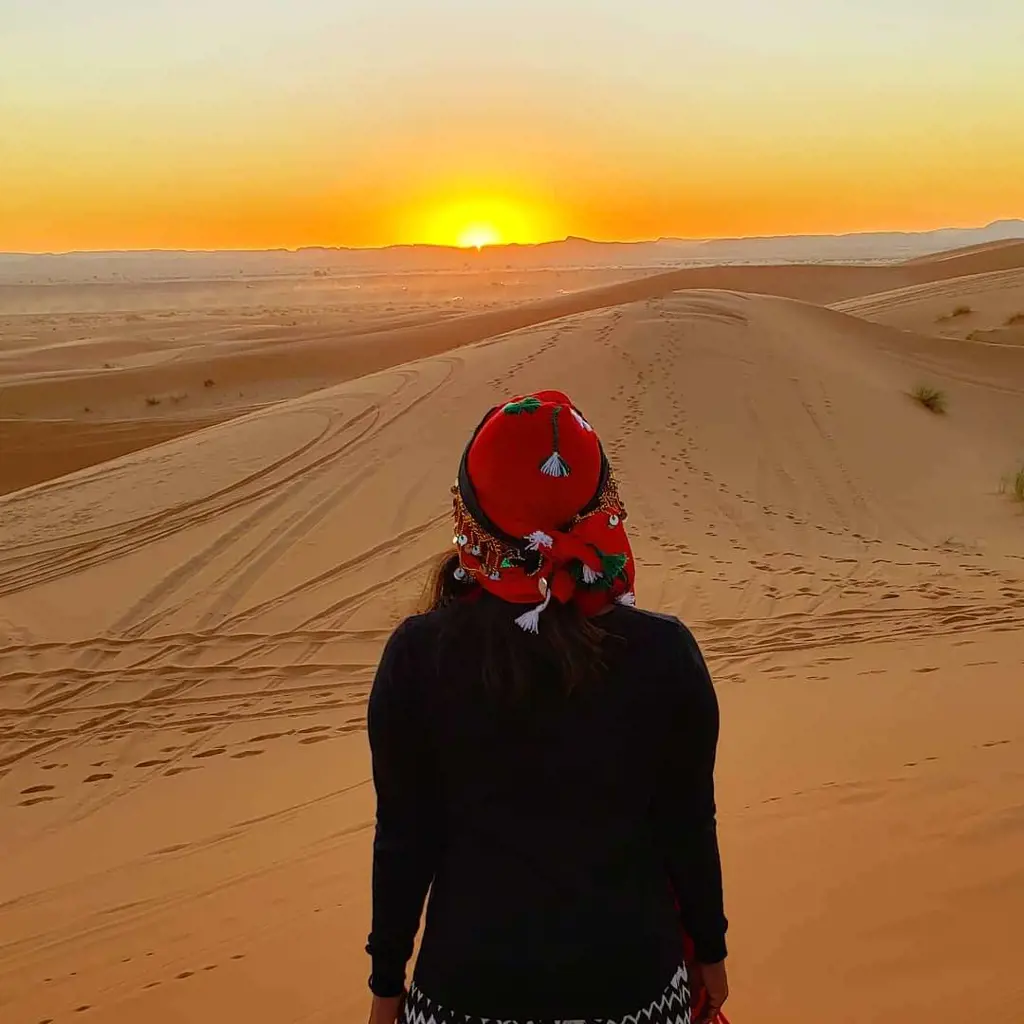
When planning a trip to explore the Sahara Desert in Morocco, it is important to come prepared with the right gear and essentials to ensure a comfortable and enjoyable experience. The desert environment can be harsh and unforgiving, so having the necessary items can make a significant difference. Here are some specific items you should consider bringing for your Sahara Desert adventure:
- Proper Clothing: Due to the extreme temperatures in the Sahara Desert, it is essential to pack clothing that will protect you from the sun during the day and keep you warm at night. Light and loose-fitting clothing made from breathable fabrics like cotton or linen is ideal for the daytime, as it allows sweat to evaporate and provides protection against the sun's rays. For the cooler nights, it is advisable to bring a warm jacket or sweater, as temperatures can drop dramatically.
- Sun Protection: The sun in the Sahara Desert can be intense, so protecting your skin from harmful UV rays is crucial. Pack a wide-brimmed hat to shield your face and neck from the sun, as well as sunglasses with UV protection to safeguard your eyes. Don't forget to bring a good quality sunscreen with a high SPF rating to apply generously on exposed skin, and consider a lip balm with SPF to prevent chapped lips.
- Footwear: When exploring the Sahara Desert, comfortable and sturdy footwear is essential. Choose closed-toe shoes or hiking boots that provide good ankle support to protect your feet from the scorching sand and potential hazards like rocks and thorns. Avoid sandals or flip-flops, as they don't offer adequate protection or stability.
- Headlamp or Flashlight: The Sahara Desert is known for its breathtaking sunsets, but it can get incredibly dark at night. A headlamp or flashlight will be invaluable for navigating your surroundings when there is no natural light available. Be sure to pack extra batteries to avoid running out of power during your journey.
- Water and Snacks: Staying hydrated is crucial in the desert, as the hot and dry conditions can quickly lead to dehydration. Pack enough water to last throughout your journey and consider bringing water purification tablets or a portable water filter in case you need to replenish your supply from natural sources. Additionally, pack high-energy snacks like nuts, granola bars, or dried fruit to keep your energy levels up during long treks.
- First Aid Kit: Accidents and injuries can happen even in the most remote locations, so it is essential to have a well-equipped first aid kit on hand. Include items like bandages, disinfectant, pain relievers, and any necessary prescription medications you may need. It is also a good idea to familiarize yourself with basic first aid techniques before embarking on your adventure.
- Navigation Tools: The vast expanse of the Sahara Desert can be disorienting and easy to get lost in. Bring a reliable map and a compass, or consider investing in a handheld GPS device to ensure you can navigate accurately and find your way back to camp or civilization if needed.
- Sleeping Gear: If you plan on spending the night in the desert, a lightweight and compact sleeping bag is essential. Temperatures in the desert can drop drastically at night, so choose a sleeping bag rated for cold temperatures to keep you warm and comfortable.
- Camera: Last but not least, don't forget to bring a camera or a smartphone with a good camera to capture the incredible landscapes and memories of your Sahara Desert adventure. The vast dunes, golden sunsets, and star-filled nights are worth capturing and sharing with loved ones.
When exploring the Sahara Desert in Morocco, having the right gear and essentials can make all the difference in ensuring a safe and enjoyable experience. By packing these specific items, you can fully immerse yourself in the beauty of the desert while staying prepared and comfortable throughout your journey.
Essential Items to Pack for a Memorable Christmas in Ireland
You may want to see also

Should I pack any medications or first aid supplies for my trip to Morocco?
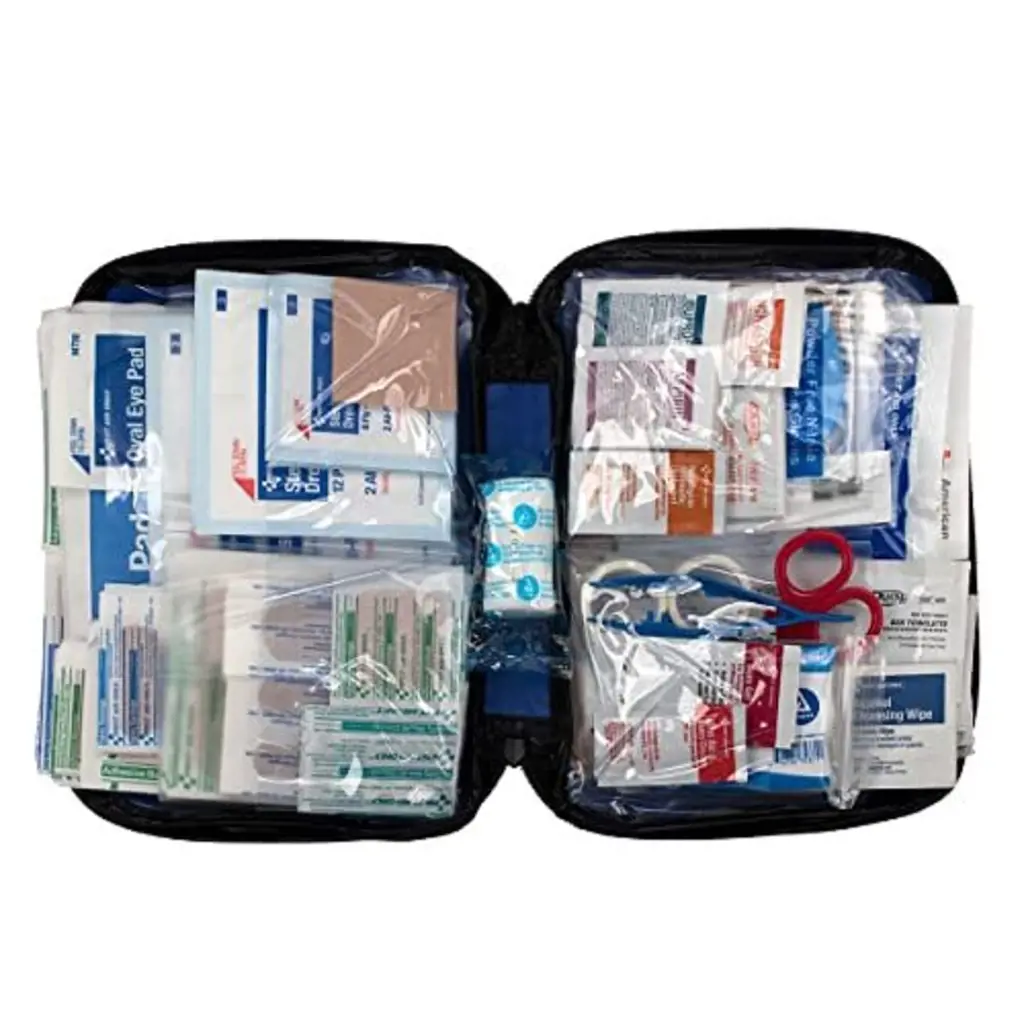
When preparing for a trip to Morocco, it is important to consider the potential medical needs you may encounter during your travels. While Morocco is a generally safe destination, it is always better to be prepared for any unforeseen circumstances. Packing appropriate medications and first aid supplies can ensure that you have the necessary resources to address minor health concerns or manage chronic conditions while away from home.
Here are some essential medications and first aid supplies that you should consider packing for your trip to Morocco:
- Prescription Medications: If you have any prescription medications, it is crucial to carry them in their original packaging and bring enough to last for the duration of your trip. It is also recommended to bring a copy of your prescription or a letter from your doctor explaining the need for the medication, as some countries may require this documentation.
- Over-the-Counter Medications: It is advisable to pack a small supply of common over-the-counter medications such as pain relievers, antidiarrheal medications, antihistamines, and cough/cold remedies. These medications can come in handy for minor ailments and can save you the trouble of locating a pharmacy in a foreign country.
- First Aid Kit: A basic first aid kit should include items such as adhesive bandages, gauze pads, adhesive tape, antiseptic wipes, tweezers, scissors, and disposable gloves. Having these supplies readily available can help treat minor injuries or wounds and prevent infection.
- Anti-Malarial Medications: Depending on the areas you plan to visit in Morocco, you may need to take anti-malarial medications as a preventive measure. It is essential to consult with a travel healthcare provider or your doctor before your trip to determine if this is necessary.
- Motion Sickness Medications: If you are prone to motion sickness or plan to engage in activities such as camel riding or mountain driving, it is advisable to bring motion sickness medications to alleviate any discomfort.
- Sunscreen and Insect Repellent: Morocco experiences hot weather, especially during the summer months, so it is important to pack sunscreen with a high SPF to protect your skin from the sun's harmful rays. Additionally, mosquito-borne diseases such as malaria and dengue fever are prevalent in some regions, so carrying an effective insect repellent is crucial.
- Personal Hygiene Items: Remember to pack personal hygiene items such as hand sanitizer, wet wipes, and any other products you typically use for your daily routine. These items can help maintain cleanliness and prevent the spread of germs.
It is essential to note that healthcare facilities and pharmacies in Morocco may not always meet the same standards as those in your home country. Therefore, it is prudent to come prepared with the necessary medications and supplies to ensure your well-being throughout your trip.
In conclusion, packing medications and first aid supplies for your trip to Morocco is a wise decision. By being prepared with essential medications, a basic first aid kit, and other healthcare necessities, you can address minor health concerns and manage any chronic conditions that may arise during your travels. Remember to consult with your doctor or a travel healthcare provider prior to your trip to determine any specific requirements or precautions you should take. It is always better to be prepared than to be caught off guard in a foreign country.
Essential Items to Pack for a Day Hike: A Comprehensive Guide
You may want to see also

Are there any cultural considerations when it comes to packing for a trip to Morocco?
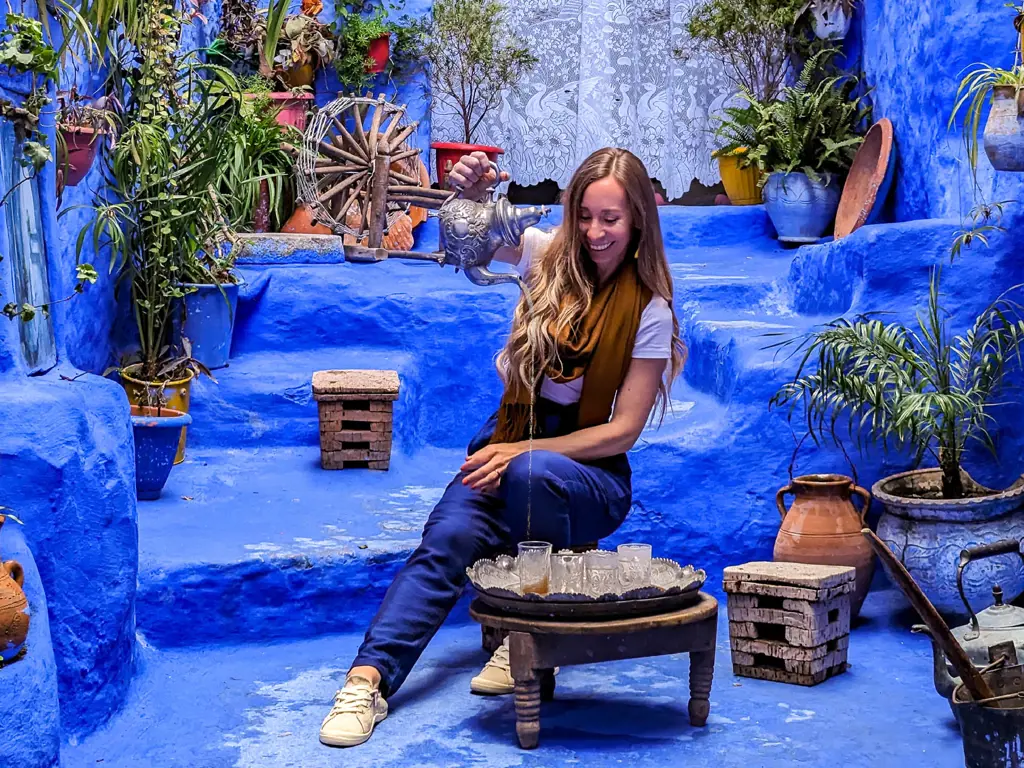
When packing for a trip to Morocco, it is important to consider the cultural norms and customs of the country. Morocco is a Muslim-majority country, and while it is relatively liberal compared to some other countries in the region, it is still important to dress modestly and respectfully. Here are some tips to keep in mind when packing for your trip to Morocco:
- Modest Clothing: Pack clothing that covers your shoulders, chest, and knees. This applies to both men and women. While it may be hot, it is important to respect the local culture and dress appropriately. Women should bring loose-fitting tops, long skirts, or pants, and a lightweight scarf to cover their shoulders when needed. Men should also bring long pants and shirts that cover their shoulders.
- Comfortable Shoes: Morocco is known for its winding streets and bustling markets, so it is important to have comfortable shoes for walking. Sneakers or closed-toe sandals are a good option, as they provide support and protection.
- Sun Protection: Morocco can get quite hot, especially in the summer months, so it is important to pack sun protection. This includes sunscreen, a hat, and sunglasses to protect yourself from the strong rays.
- Adapt to the Weather: Morocco has a diverse climate, ranging from mountainous regions to coastal areas and desert landscapes. Check the weather forecast for the specific regions you plan to visit and pack accordingly. Layers are always a good idea, as temperatures can fluctuate throughout the day.
- Respect for the Holy Month of Ramadan: If you happen to be visiting during the holy month of Ramadan, it is important to be respectful of the fasting customs. This means refraining from eating, drinking, or smoking in public during the daylight hours. It is also a good idea to dress even more conservatively during this time.
- Respectful Swimwear: If you plan to visit the beach or go swimming, it is important to bring swimwear that is modest. Women should avoid wearing bikinis or revealing swimsuits, and men should also opt for more modest swim shorts.
- Traditional Clothing: If you want to fully immerse yourself in the Moroccan culture, you can consider packing traditional Moroccan clothing such as a kaftan or djellaba. These are comfortable and modest options that are commonly worn by locals.
It is always a good idea to research the specific regions you plan to visit in Morocco and familiarize yourself with any local customs or dress codes. By respecting the local culture and following these packing tips, you will be able to have a more authentic and enjoyable experience during your trip to Morocco.
The Essential Packing List for Home Sellers Still Waiting for a Sale
You may want to see also
Frequently asked questions
It is recommended to pack lightweight, breathable clothing for Morocco, especially during the summer months when the temperatures can get quite high. Opt for loose-fitting clothes that cover your shoulders and knees to respect the local culture. It can also be beneficial to pack a lightweight scarf or shawl to cover your shoulders or use as a headscarf when visiting religious sites.
If you're planning on taking a desert trip in Morocco, it is important to pack some specific items. These include a hat and sunglasses to protect yourself from the intense sun, comfortable closed-toe shoes or sandals for walking in the sand, and a lightweight and breathable long-sleeved shirt and pants to protect yourself from the desert winds and sand.
It is recommended to pack a combination of comfortable walking shoes and sandals when visiting Morocco. Choose shoes that have good support and are suitable for walking on various terrains, as you may be exploring both cities and natural landscapes. Sandals can be useful for keeping your feet cool in the hot weather, especially when visiting beaches and coastal areas.
There are a few essential items that you should consider packing for a trip to Morocco. These include a travel adapter to charge your electronic devices, sunscreen to protect your skin from the strong sun, a reusable water bottle to stay hydrated, and a small first aid kit with basic medications and band-aids. It is also important to have a copy of your passport and other important documents in case of an emergency.
In terms of toiletries, it is recommended to pack travel-sized versions of your essentials such as shampoo, conditioner, and body wash. Although these items can be purchased in Morocco, having your preferred brands can be more convenient. It is also important to pack a good mosquito repellent, as mosquitoes can be prevalent in certain areas of the country. Additionally, consider packing a reusable water bottle with a built-in filter to ensure access to clean drinking water.





